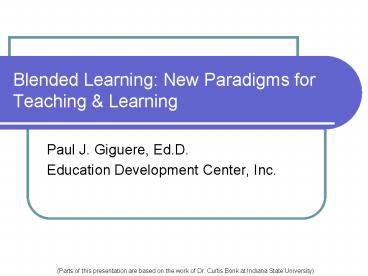Blended Learning: New Paradigms for Teaching - PowerPoint PPT Presentation
1 / 20
Title:
Blended Learning: New Paradigms for Teaching
Description:
... when they are face-to-face while still enjoying the benefits of electronic ... be more structured with their time while away from the face-to-face environment ... – PowerPoint PPT presentation
Number of Views:158
Avg rating:3.0/5.0
Title: Blended Learning: New Paradigms for Teaching
1
Blended Learning New Paradigms for Teaching
Learning
- Paul J. Giguere, Ed.D.
- Education Development Center, Inc.
(Parts of this presentation are based on the work
of Dr. Curtis Bonk at Indiana State University)
2
Blended Learning
- What is blended learning?
- What is being blended?
- Why blend?
- How to blend?
3
Hybrid vs. Blended
- Hybrid is the interbreeding of two different
species of animals or plants to create a new
species (i.e. a mongrel) - Blended focuses on the mingling together in ways
that lead to a well-balanced combination (i.e. a
margarita)
(Osguthorpe Graham, 2003, Blended Learning
Environment Definitions and Directions)
4
Blended Learning Definitions
- Three most commonly cited definitions include
- BL combining instructional modalities/media
(e.g. self-paced and streaming video) - BL combining instructional methods
- BL combining on-line and F2F instruction
5
Our Operational Definition
- Blended Learning systems that combine
face-to-face instruction with computer-mediated
communication - More interactive than just online technologies
- Emphasizes the central role of computer-based
technologies - Definition is consistent with the historical
emergence of the concept of BL
6
What is being blended?
- Instructional modalities/media (web,
instructor-led discussion, simulations,
documents, multimedia) - Instructional methods (pedagogies behavioral
constructivist) - Online and face-to-face instruction
- On-the-job training, project-related activities,
class group work - Live and self-paced training
(Graham, Ure, Allen (2003, July). Blended
Learning Environments A Literature Review and
Proposed Research Agenda)
7
Why Blend?
- Improved Pedagogy (or Androgogy)
- Interactive vs. Transmission environments
- Authenticity integration into work
- Increased Access/Flexibility
- Reduces seat time
- Increased Cost Effectiveness
- Corporate ROI (IBM 471, Avaya, Microsoft)
- Higher Ed (PEW, NSF)
8
Blended Learning Advantages
- Increased Learning (better papers, higher scores,
etc.) - More effective pedagogy and interaction
- Course access at ones convenience and flexible
completion - Reduction in physical meeting time, space needs,
travel, etc. - Increased opportunities for human interaction
communication - Introverts participate more
9
Potential Benefits w Blended Learning
- Materials are available all the time
- Materials are more learner-centered than lecture
- Online tools can be made available such as
white-boards, discussions, and chat rooms - Links to other material can be provided
- Information can be presented is various media
formats
10
Potential Benefits w Blended Learning cont.
- Multiple adult learning styles can be
accommodated - Learners may find it easier to keep up in a
blended training as opposed to a strictly on-line
one - On-going virtual communities of practice can be
established that support continued adult learning
- It may be easier for learners to work on group
projects when they are face-to-face while still
enjoying the benefits of electronic communication
and collaboration
11
Blended Learning Disadvantages
- Procrastination (trouble managing time and
requirements) - Problems with technology
- Can be overwhelming or too novel
- Poor integration or planning
- Resistance to change
- Good ideas but lack of time, money, support
12
Potential Problems w Blended Learning
- Need to learn how to adapt certain material for
on-line use - Need to learn how to teach and facilitate the
on-line learning experience - Learners may lack necessary Web skills and/or
they may not be familiar with using a Learning
Management System (LMS) - Learners generally need to be more structured
with their time while away from the face-to-face
environment - Learners may need additional instruction in
evaluating on-line resources and materials not
provided by the facilitator - Learners and facilitators may need to spend more
time participating in asynchronous discussions
on-line
13
How to Blend Models of Blending
- Activity Level
- (e.g. start F2F and complete on-line)
- Course Level
- (e.g. alternate F2F and on-line activities)
- Program Level
- (e.g. prescriptive blends where student chooses
which blend they want and when) - Institutional Level
- (e.g. participants choose between
technology-enhanced, blended, or on-line)
14
Forms of Blended Learning for Authentic Tasks
- Real World email, discussion, chat
- Ill-structured problem solving meet F2F, online
supports - Different perspectives discussion, email,
expert chats - Collaboration email, discussion boards, blogs,
collab tools, F2F - Reflection discussion boards, blogs
15
Instructional Methods for Online Learning
- Self-assessment activities
- Situation analysis
- Brainstorming
- Mini-lectures
- Discussion groups
- Role playing
- Case studies
- Games/simulations
- Cooperative-group work
- Forums
- Guest experts
16
Where is Blended Learning Beneficial?
- Large Classes (aka workshops, trainings, etc.)
- Classes with certification
- Classes with need for standardization
- Supplementary classes
- New requirements for a profession
- Massive and widespread audience
17
How Effective is Blended Learning?
Brain Development
18
How Effective is Blended Learning?
Dental Hygiene
19
How Effective is Blended Learning?
Personal Relationships
20
Blended learning is in your future. . .































